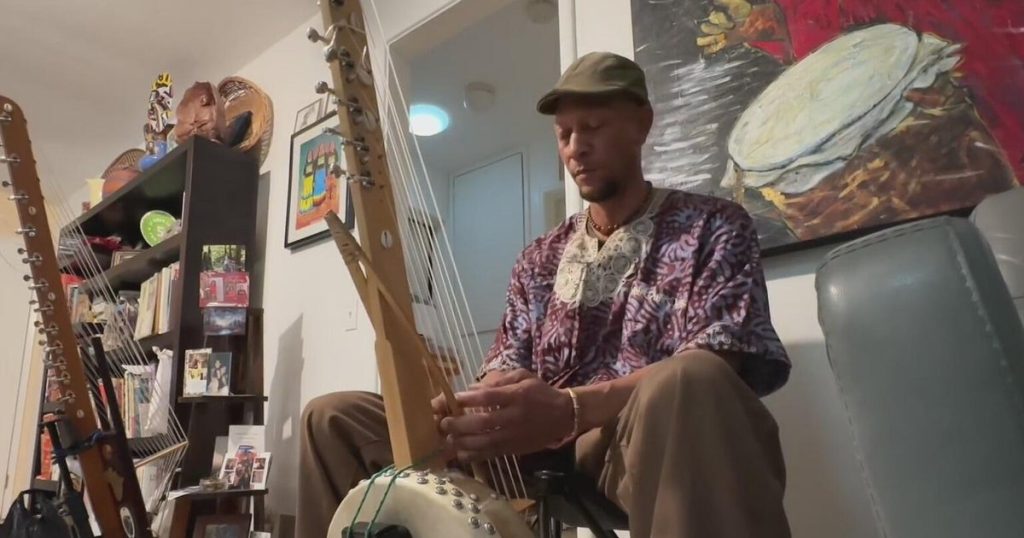In celebration of Black History Month, musicians in the Bay Area, particularly those with West African roots, are finding increased opportunity to showcase their art and heritage. Among them is Keenan Webster, a talented artist who plays the kora, a traditional West African instrument. His journey of musical expression not only allows him to connect with his cultural roots but also engages communities in understanding the significance of the African influence in contemporary music.
| Article Subheadings |
|---|
| 1) A Journey Through Music and Ancestry |
| 2) Celebrating Black History in Marin County |
| 3) The Influence of African Soundscapes |
| 4) Bridging Cultures Through Performance |
| 5) The Significance of Cultural Recognition |
A Journey Through Music and Ancestry
As a child growing up in rural Tennessee, Keenan Webster was deeply influenced by gospel music. The sounds of West African music echoed through modern folk and blues, intensifying his yearning to connect with his heritage. However, it wasn’t until he was well into his twenties that he began his journey as a musician, playing the kora—the West African harp that has served as a vital cultural instrument for generations. Keenan‘s gradual discovery of his musical abilities was intertwined with a recent personal revelation from a DNA ancestry test which revealed his roots in the Mandinka and Mande-speaking peoples of West Africa. This finding provided him a spiritual connection to the music he had been drawn to throughout his life.
Celebrating Black History in Marin County
This February, Marin County’s libraries have come alive with a range of performances and programming aimed at honoring Black History Month. One highlight from the lineup was Keenan Webster, who performed on February 20th at public libraries across the county, sharing his profound heritage through musical storytelling. Alongside the performance, Andre Thierry, a Grammy-nominated musician, also participated in initiatives to uplift and celebrate underrepresented voices in the community. The two artists were not only tasked with entertaining their audiences but also with educating them about the rich cultural histories mirrored in their performances, reinforcing the idea that collective memory is intertwined with the music.
The Influence of African Soundscapes
The kora, which Keenan plays, is a significant symbol of West African musical tradition, and it is often referred to as the “African harp.” While performing, he draws from the depths of African rhythms and melodies that have transcended generations.
“Spiritually, it made sense why I gravitated to these instruments,”
he reflects, underscoring how these traditional sounds convey experiences of pain, hope, and resilience. As Keenan introduces diverse audiences to these instruments, he aims to evoke a deeper understanding of how these African influences shape contemporary music genres today.
Bridging Cultures Through Performance
Through music, Keenan Webster aspires to bridge cultural divides and foster connections among people from various backgrounds. His passion stems from an inherent desire to share the stories of his ancestors and the multitude of historical experiences tied to those narratives.
“It helps people to have more respect for other people’s cultures,”
he states, capturing the essence of his mission. By performing at community libraries, he aims to create a space conducive to exploration and appreciation of diverse cultural backgrounds, allowing audiences to engage with the significance of the African musical heritage.
The Significance of Cultural Recognition
Black History Month serves as a powerful reminder of the struggles and triumphs faced by African Americans throughout history. For Keenan, participating in celebrations that highlight these histories offers him an opportunity to honor his ancestors. His messages are not just for entertainment; they are an appeal for acknowledgment and respect for the cultural legacies that shape our modern societal landscape. As he channels his artistic voice through music, he embodies the spirit of perseverance while calling attention to the profound connections between history and art.
| No. | Key Points |
|---|---|
| 1 | Keenan Webster uses the kora to connect with his West African heritage and share stories rooted in history. |
| 2 | The Marin County library events are designed to uplift underrepresented voices during Black History Month. |
| 3 | Music has significant historical roots that connect contemporary sounds with African traditions and experiences. |
| 4 | By sharing his passion for music, Webster aims to build cultural respect and understanding among diverse communities. |
| 5 | Black History Month serves not only to commemorate past struggles but also to inspire recognition of cultural legacies in current times. |
Summary
This year’s Black History Month in Marin County has illuminated the importance of cultural heritage through music, exemplified beautifully by artists like Keenan Webster. His performances not only entertain but also educate audiences about the deep connections between music and history, promoting respect and understanding of African American cultures. As more local musicians seize the opportunity to share their stories, this month serves as a pivotal moment for communities to come together and celebrate their complex legacies.
Frequently Asked Questions
Question: What is the significance of the kora in West African culture?
The kora is a traditional instrument in West Africa that serves as a significant cultural symbol, often used in storytelling and conveying historical narratives through its unique sound.
Question: Why is Black History Month important?
Black History Month is vital as it honors the contributions of African Americans and reminds society of the struggles and achievements throughout history, fostering a deeper understanding of cultural legacies.
Question: How can music promote cultural understanding?
Music can bridge cultural divides by shared experiences, resonating with listeners on emotional levels and opening avenues for dialogue about heritage and the significance of different cultural practices.


